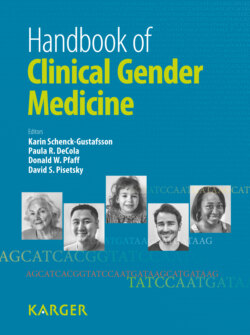Читать книгу Handbook of Clinical Gender Medicine - Группа авторов - Страница 22
На сайте Литреса книга снята с продажи.
The Final Word
ОглавлениеThe effects of gender inequities on global health are clear and far reaching. Their magnitude is a potent driver and catalyst for change. In an attempt to address these disparities, gender mainstreaming has evolved as a process in which issues related to gender inequities are given attention when making policies, designing programs, and providing services. This is included within both the legislative and the financial domains. While gender mainstreaming goes beyond the health sector, it is a critical element within it. In theory it should be framed by human rights, be inclusive of men, women, and LGBT people, and span preventive, curative, and rehabilitative healthcare services. While gender mainstreaming as a concept has great merit, it remains more of a promise than a widespread practice.
Another strategy aimed at addressing sex-based differences is the intentional increase in women within the healthcare professionals, within leadership positions in healthcare institutions, and within key political roles. While this intervention is admirable, it will by itself do little to affect equity within health systems since it is not a panacea for creating gender-sensitive health systems. The issue is far more complex and the interventions need to address inequity in broader terms.
Further, while the call for universal healthcare is well intentioned, it may have little or no impact on the gender-related disparities inherent in health systems unless we also address empowerment, access to education, gender-based violence, and hetero-centricity; these societal factors are prerequisites for the desired sea change and without them there will be little movement in terms of improving the overall health of society at large.
At the core of health systems is the tenet ‘to put people first’. To do this we must put sex and gender front and center. Although gender medicine is not a new therapeutic area, it is a new dimension for healthcare professionals and healthcare systems. Since healthcare systems are shaped by the society in which they operate, the change which needs to occur must permeate how these systems operate and how people relate as well as how people operate within these systems.
Ultimately, the success of a sex-and gender-based approach to health will be dependent on healthcare professionals who, among other actions, will need to play a leadership role as advocates in order to break the cycle of gender-based neglect. Advocacy and action must occur in a number of domains including policy, research, healthcare professional education, and clinical practice guidelines. Available and additional evidence needs to be generated and then put into practice across all of these domains. Additionally, education of patients must be coupled with broad awareness of all healthcare consumers.
Men, women, and LGBT people are waiting for healthcare systems that minimize inequities in health status, disease distribution, and access to services. They are also waiting for gender-sensitive approaches to their care. Let us not keep these patients waiting.
